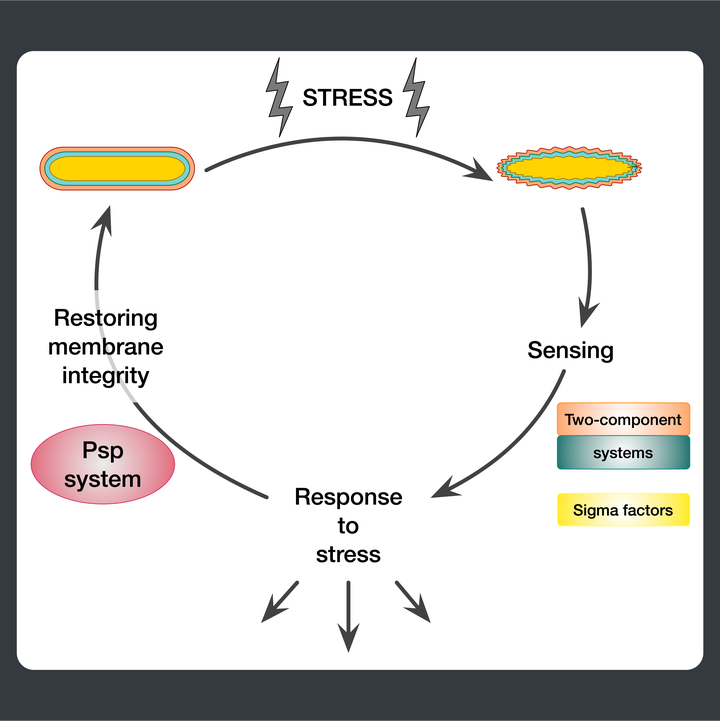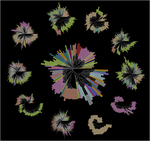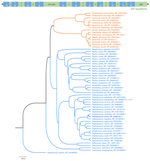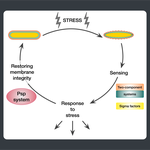Bacterial Stress Response
Nov 7, 2018
Research

Summary
I started working on bacterial stress responses during my postdoctoral research at Rutgers University, I continue to focus on using computational evolutionary approaches to study various facets of pathogen biology including:
- delineating the molecular mechanism underlying a newly identified stress response operon in the tubercle bacterium involving the phage-shock-proteins (psp);
- unraveling the evolution of bacterial stress response systems (psp) across the tree of life using protein sequence-structure-function relationships;
- reconstructing and analyzing the mycobacterial sigma factor regulatory network.
Students
- Samuel Chen (Alumni)
Collaborators
- Marila Gennaro (Rutgers)
- L Aravind (NCBI, NIH)
- Vivek Anantharaman (NCBI, NIH)
stress-response
phylogeny
molecular-evolution
tree-of-life
mycobacteria
past-work
ongoing
compbio-bioinfo
Janani Ravi
Assistant Professor
My research interests include computational pathogenomics and host-directed drug-repurposing.
Related
- The Psp system of Mycobacterium tuberculosis integrates envelope stress-sensing and envelope-preserving functions
- Variations on a theme: evolution of the phage-shock-protein system in Actinobacteria
- Using computational appraches to understand host-pathogen biology
- Reconstruction and topological characterization of the sigma factor regulatory network of Mycobacterium tuberculosis
- Host-responses to infection
Publications
Unlocking antimicrobial resistance with multiomics and machine learning
The global antimicrobial resistance (AMR) emergency is driven by complex and evolving molecular mechanisms. Cutting-edge machine …
The phage shock protein (PSP) envelope stress response: discovery of novel partners and evolutionary history
Bacterial phage shock protein (PSP) systems stabilize the bacterial cell membrane and protect against envelope stress. These systems …
Reconstruction and topological characterization of the sigma factor regulatory network of Mycobacterium tuberculosis
Accessory sigma factors, which reprogram RNA polymerase to transcribe specific gene sets, activate bacterial adaptive responses to …
Rinki Chauhan, Janani Ravi, Pratik Datta, Tian Chen, Dirk Schnappinger, Kevin Bassler, Gabor Balázsi, Maria Gennaro
The Psp system of Mycobacterium tuberculosis integrates envelope stress-sensing and envelope-preserving functions
The bacterial envelope integrates essential stress-sensing and adaptive functions; thus, envelope-preserving functions are important …
Talks
Computational approaches to study molecular pathogenesis and intervention of infectious diseases
Nov 22, 2021 8:00 PM — 9:00 PM
Virtual (Colorado)
MolEvolvR: Web-app and R-package for characterizing proteins using molecular evolution and phylogeny
Molecular evolution and phylogeny can provide key insights into pathogenic protein families. Studying how these proteins evolve across …
Jul 9, 2021 8:00 PM — 9:00 PM
Virtual (Global)
Using a computational molecular evolution and phylogeny to study pathogenic proteins
Background: Studying bacterial physiology, adaptation, and pathogenicity through the lens of evolution requires delineating the …
May 13, 2021 8:00 PM — 9:00 PM
Virtual
Molecular Evolution and Phylogeny
Feb 27, 2020 9:00 AM — 10:00 AM
Michigan State University, East Lansing, MI
Computational approaches for understanding host–pathogen biology
Aug 27, 2019 11:00 AM — 11:15 AM
College of Human Medicine, Michigan State University, Grand Rapids, MI
Conservation and modularity in the pan-bacterial psp stress response system
Jul 26, 2019 3:00 AM — 3:30 AM
University of Maryland, College Park, MD
An integrative computational evolutionary approach to accelerate the discovery of molecular targets in prevalent under-studied pathogens
May 16, 2019 9:00 AM — 12:00 PM
Michigan State University, East Lansing, MI
Using computational appraches to understand host-pathogen biology
Jul 9, 2018 3:50 PM — 4:00 PM
Chicago, IL
Evolution and Conservation of the Psp Envelope Stress-Response System
Apr 3, 2017 5:00 PM — 7:00 PM
New York, NY
Microbial Mechanosensing: Phage Shock Protein Response System in Gram-positive Bacteria
Jun 18, 2016 2:45 PM — 3:00 PM
Boston, MA















